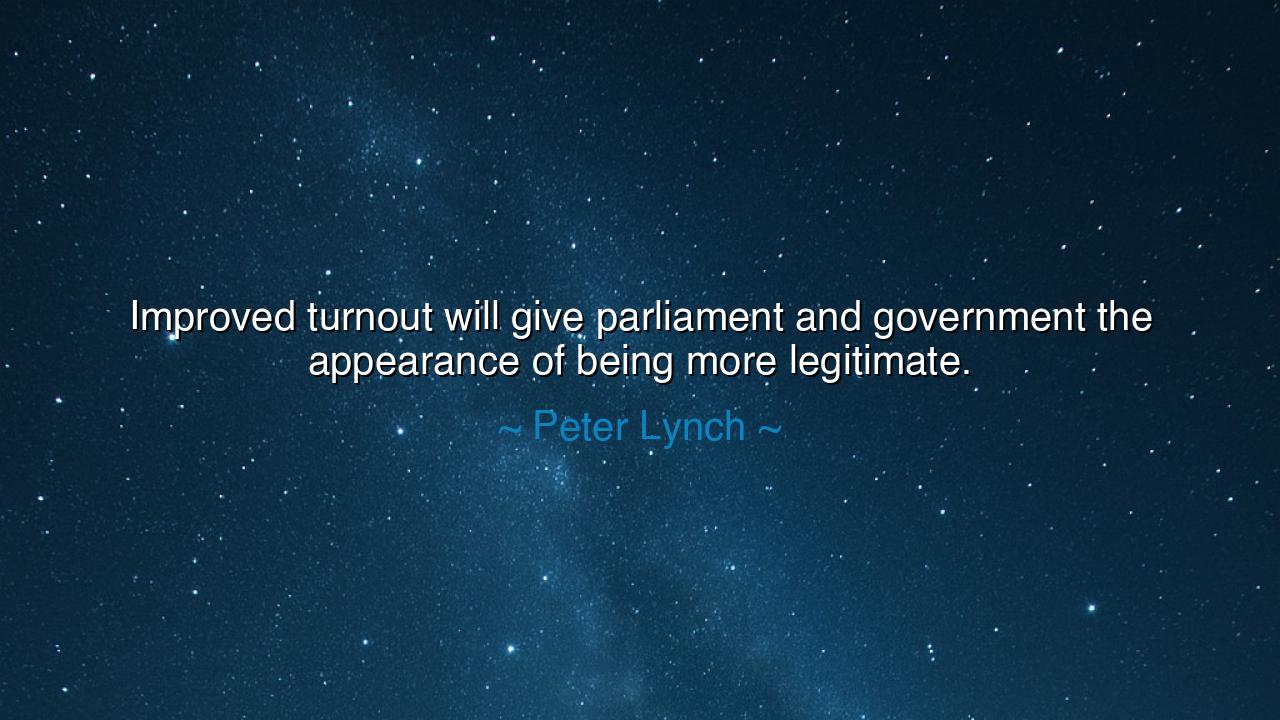
Improved turnout will give parliament and government the
Improved turnout will give parliament and government the appearance of being more legitimate.






In the quiet language of democracy, where the voice of every citizen is meant to carry the weight of destiny, Peter Lynch once wrote: “Improved turnout will give parliament and government the appearance of being more legitimate.” At first glance, these words may seem simple—a scholar’s reflection on civic participation. But beneath their calm surface lies a profound truth: that the strength of a nation’s government does not rest upon its armies or wealth, but upon the faith of its people. For a government without participation is like a temple without worshippers—grand in structure, yet empty in spirit.
Lynch, a political thinker and historian of democracy, understood the fragile bond between the ruler and the ruled. His words speak to the eternal challenge of all free societies: that the power of government flows not from decree, but from consent. When turnout—the act of citizens casting their vote—dwindles, the legitimacy of the system itself begins to fade. A parliament may still sit, laws may still be passed, but the people’s trust begins to waver. It is not enough that a government exists; it must be seen as rightful in the eyes of those it governs. This, Lynch reminds us, is the sacred currency of democracy—legitimacy, born of participation and sustained by engagement.
To grasp the weight of these words, one must remember that the struggle for the right to vote has been one of humanity’s most painful and noble battles. From the reformers of nineteenth-century Britain, who demanded representation for the working classes, to the civil rights movement in America, where men and women faced violence to claim their voice, the ballot has always been more than a mark on paper—it is the symbol of equality, of dignity, of belonging. Yet how tragic it is, as Lynch laments, that once the right to vote is won, so many choose to stay silent. For every empty polling booth weakens the spirit of democracy; every uncast vote becomes a stone removed from the foundation of freedom.
The ancients, too, understood this truth, though their words were older and their systems simpler. In the Athenian agora, the philosopher Pericles declared that “we do not say that a man who takes no interest in politics is a man who minds his own business; we say he has no business here at all.” To participate was to exist; to withdraw was to vanish from the life of the polis. The same principle echoes in Lynch’s warning: that when citizens retreat into apathy, the institutions they leave behind begin to lose their soul. A government may still function—but its heart no longer beats in rhythm with its people.
Consider, then, the lesson of the Weimar Republic in Germany, where economic despair and political cynicism led to voter disengagement. Turnout dropped, extremism rose, and the enemies of democracy found their opening. When people cease to believe that their vote matters, they surrender the power that safeguards their freedom. And once lost, it is not easily regained. Thus, Lynch’s words are not merely descriptive—they are prophetic. He does not speak only of appearance, but of reality: for in democracy, appearance and legitimacy are one. When participation falters, legitimacy fades, and when legitimacy fades, tyranny waits at the door.
Yet there is hope in his message as well. For improved turnout, he says, can restore the image—and the essence—of legitimacy. The act of voting is both a duty and a renewal, a ritual through which the people breathe life into their institutions. Each vote, no matter how small, is a spark of faith in the idea that collective will can triumph over chaos. When citizens rise from apathy and claim their voice, governments are strengthened not by fear, but by trust. The parliament, once distant and abstract, becomes again the mirror of the people’s will—the living expression of shared purpose.
Therefore, my children of the modern world, learn this truth well: freedom is not preserved by silence, but by participation. Do not wait for perfect leaders or flawless systems before you act, for perfection never arrives; but the duty to choose endures. Go to the polls not as supplicants, but as guardians of a sacred inheritance. For every vote cast, however humble, is an act of defiance against apathy and an affirmation of hope.
So let the wisdom of Peter Lynch endure: that improved turnout is not merely a matter of numbers, but of spirit—the renewal of the bond between the people and their government. A parliament is legitimate only when its voice echoes the will of its citizens. And the will of the people, like a flame, must be tended lest it fade. Therefore, vote, speak, engage—for in your participation lies not only the legitimacy of government, but the salvation of democracy itself.






AAdministratorAdministrator
Welcome, honored guests. Please leave a comment, we will respond soon